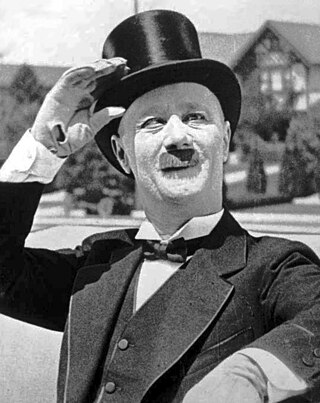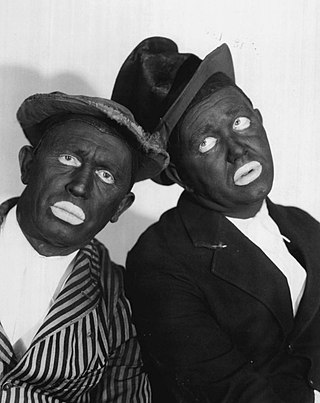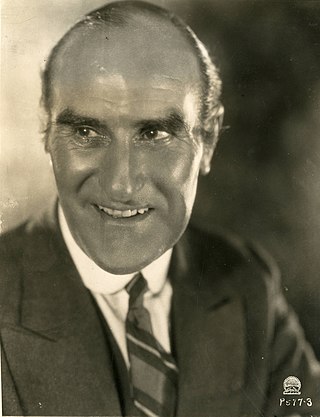Related Research Articles

Mack Sennett was a Canadian-American producer, director, actor, and studio head who was known as the "King of Comedy" during his career.

Delmer "Del" Lord was a Canadian film director and actor best known as a director of Three Stooges films.

Bernard "Ben" Turpin was an American comedian and actor, best remembered for his work in silent films. His trademarks were his cross-eyed appearance and adeptness at vigorous physical comedy. A sometimes vaudeville performer, he was "discovered" for film while working as the janitor for Essanay Studios in Chicago. Turpin went on to work with notable performers such as Charlie Chaplin and Laurel and Hardy, and was a part of the Mack Sennett studio team. He is believed to have been the first filmed "victim" of the pie in the face gag. When sound came to films, Turpin chose to retire, having invested profitably in real estate, although he did do occasional cameos.

Tillie's Punctured Romance is a 1914 American silent comedy film directed by Mack Sennett and starring Marie Dressler, Mabel Normand, Charlie Chaplin, and the Keystone Cops. The picture is the first feature-length comedy and was the only feature-length comedy made by the Keystone Film Company.

The Two Black Crows was a blackface comedy act popular in the 1920s and 1930s. The duo appeared in vaudeville, on Broadway, on radio, comedy records, and in film features and shorts.

Educational Pictures, also known as Educational Film Exchanges, Inc. or Educational Films Corporation of America, was an American film production and film distribution company founded in 1916 by Earle Hammons (1882–1962). Educational primarily distributed short subjects; it is best known for its series of comedies starring Buster Keaton (1934–37) and the earliest screen appearances of Shirley Temple (1932–34). The company ceased production in 1938, and finally closed in 1940 when its film library was sold at auction.

Ernest Torrence was a Scottish film character actor who appeared in many Hollywood films, including Broken Chains (1922) with Colleen Moore, Mantrap (1926) with Clara Bow and Fighting Caravans (1931) with Gary Cooper and Lili Damita. A towering figure, Torrence frequently played cold-eyed and imposing villains.

Ford Sterling was an American comedian and actor best known for his work with Keystone Studios. One of the 'Big 4', he was the original chief of the Keystone Cops.

Daphne Pollard was an Australian-born vaudeville performer and dancer, active on stage and later in US films, mostly short comedies.

Lloyd Vernon Hamilton was an American film comedian, best remembered for his work in the silent era.

Earle W. Hammons, known professionally as E. W. Hammons, was an American film producer,. He produced more than 220 films between 1921 and 1938.

Pathé Exchange, commonly known as Pathé, was an American film production and distribution company, largely of Hollywood's silent era. Known for its trailblazing newsreel and wide array of shorts, it grew out of the American division of the major French studio Pathé Frères, which began distributing films in the United States in 1904. Ten years later, it produced the enormously successful The Perils of Pauline, a twenty-episode serial that came to define the genre. The American operation was incorporated as Pathé Exchange toward the end of 1914 and spun off as an independent entity in 1921; the Merrill Lynch investment firm acquired a controlling stake. The following year, it released Robert J. Flaherty's groundbreaking documentary Nanook of the North. Other notable feature releases included the controversial drama Sex (1920) and director/producer Cecil B. DeMille's box-office-topping biblical epic The King of Kings (1927/28). During much of the 1920s, Pathé distributed the shorts of comedy pioneers Hal Roach and Mack Sennett and innovative animator Paul Terry. For Roach and then his own production company, acclaimed comedian Harold Lloyd starred in many feature and short releases from Pathé and the closely linked Associated Exhibitors, including the 1925 smash hit The Freshman.

The Golden Age of Comedy (1957) is a compilation of silent comedy films from the Mack Sennett and Hal Roach studios, written and produced by Robert Youngson.

Clark and McCullough were a comedy team consisting of comedians Bobby Clark and Paul McCullough. They starred in a series of short films during the 1920s and 1930s. Bobby Clark was the fast-talking wisecracker with painted-on eyeglasses; Paul McCullough was his easygoing assistant named Blodgett.

The L-KO Kompany, or L-KO Komedies, was an American motion picture company founded by Henry Lehrman that produced silent one-, two- and very occasionally three-reel comedy shorts between 1914 and 1919. The initials L-KO stand for "Lehrman KnockOut".

A Wreath in Time is a 1909 American silent comedy film written and directed by D. W. Griffith, produced by the Biograph Company of New York City, and co-starring Mack Sennett and Florence Lawrence. At its release in February 1909, the short was distributed to theaters on a "split reel", which was a single reel that accommodated more than one film. A Wreath in Time shared its reel with another Biograph short also directed by Griffith, the drama Edgar Allen Poe [sic]. Original paper rolls of contact prints of both motion pictures, as well as safety-stock copies of the two films, are preserved in the Library of Congress.
Anybody's War is a 1930 American pre-Code Two Black Crows comedy film directed by Richard Wallace and written by Lloyd Corrigan, Hector Turnbull and Walter Weems. The film stars George Moran, Charles Mack, Joan Peers, Neil Hamilton, Walter Weems and Betty Farrington. The film was released on July 10, 1930, by Paramount Pictures.

Charles Sellers was an American minstrel show performer who worked in blackface under the stage name Charles Mack. He worked with John Swor and later George Moran as the Two Black Crows.

George Moran was an American minstrel show performer who worked in blackface. He worked with Charles Mack as the Two Black Crows from 1921 to 1930. He also portrayed Native Americans in comedy films.